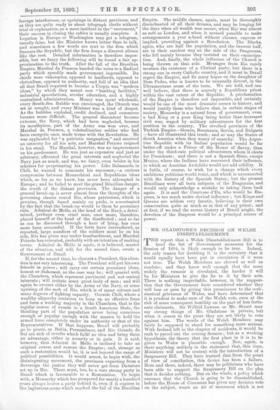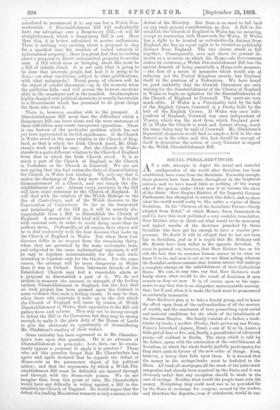MR. GLADSTONE'S DECISION ON WELSH DISE STABLISFIMENT.
MHE report that a Welsh Disestablishment Bill is to head the list of Government measures for the Session of 1894, is likely enough to be true. Indeed, the only reason for doubting it is the certainty that it would equally have been put in circulation if it were not true. The Welsh Members are shrewd as well as resolute ; and they know well enough that the more widely the rumour is circulated, the harder it will be for Ministers to give the lie to it by their acts. There is nothing improbable, however, in the supposi- tion that the Government have considered whether they will lose or gain by giving this prominence to the cock- siastical grievance of Wales, and have determined that it is prudent to make sure of the Welsh vote, even at the risk of some consequent hostility on the part of less fortu- nate claimants. Sir Wilfrid Lawson or Mr. Stuart may say strong things of Mr. Gladstone in private, but when it comes to the point they are not likely to vote against him. The words of the Welsh Members may fairly be supposed to stand for something more serious. With Ireland left in the chapter of accidents, it would be rash to parcel-out the coming Session ; but as a working hypothesis, the theory that the first place in it is to be given to Wales is plausible enough. Nor, again, is there anything unlikely in the statement that, this time, Ministers will not be content with the introduction of a Suspensory Bill. They have learned that from the point of view of conciliation, this device has been a failure. Here and there, indeed, there may be politicians who have been able to support the Suspensory Bill on the plea that it decides nothing. But on the whole, a policy which assumes that the Church is going to be disestablished, before the House of Commons has given any decisive vote on the subject, wears an air of meanness which is not eAlculated to recommend it ta any one but a Welsh Non- conformist. A Disestablishment Bill will undoubtedly have one advantage over a Suspensory Bill,—it will be straightforward, which a Suspensory Bill is not. More than this, it is better calculated to arouse enthusiasm. There is nothing very exciting about a proposal to stop for a specified time the creation of vested interests in ecclesiastical property ; there is a great deal that is exciting about a proposal to divert ecclesiastical property to secular uses, A Bill which aims at bringing about this must be a Bill of infinite detail. It is not only what is going to be done that interests people, but how it is going to be done,—on what conditions, subject to what qualifications, with what safeguards ? Every group of clauses will be the object of careful discussion—up to the moment when the guillotine falls—and will arouse the keenest emotions alike in the assailants and in the assailed. An atmosphere highly charged with political electricity is usually favourable to a Government which has promised to do great things for those who trust it.
There is, however, another side to the prospect. A Disestablishment Bill must face the difficulties which a Suspensory Bill can leave alone, and the mere statement of these difficulties may create unexpected opposition. There is one feature of the particular problem which has not yet been appreciated in its full significance. If the Church in Wales stood in the same relation to the Church of Eng- land, as that in which the Irish Church stood, Mr. Glad- stone's work would be easy. But the Church in Wales stands in a quite different relation to the Church of England from that in which the Irish Church stood. It is as much a part of the Church of England as the Church in Yorkshire or the Church in Cornwall. We are not now saying that this fact makes the duty of disestablishing the Church in Wales less binding. We only say that it makes the discharge of the duty more difficult. It is the dismemberment of a, Church, and not simply the dis- establishment of one, Almost every provision in the Bill will have some reference to the Church of England. It will deal with the relation of the Welsh Bishops to the See of Canterbury, and of the Welsh dioceses to the Convocation of Canterbury. So far as the framework and terminology of the Bill go, it will be scarcely dis- tinguishable from a Bill to disestablish the Church of England. A measure of this kind will have to be drafted with unusual care, in order to avoid doing more than its authors mean. Professedly, at all events, their object will be to deal exclusively with the four dioceses that make up the Church of England in Wales. But when these four dioceses differ in no respect from the remaining thirty, when they are governed by the same ecclesiastic laws, and subjected to the same ecclesiastical superiors, it will be easy to legislate unintentionally for the unit while intending to legislate only for the fraction. For the same reason, the attempt will be more dangerous in Wales than it was in Ireland. Even lukewarm friends of the Established Church may feel a reasonable alarm at a proposal to disestablish a part of it. We do not profess to measure the amount or strength of the feeling against Disestablishment in England, but the fact that no such project has been pressed upon the Cabinet is some evidence that such a feeling exists. It may be that, when those who entertain it wake up to the risk which the Church of England will incur by reason of Welsh Disestablishment in Wales, their opposition to the Bill will gather force and volume. They may not be strong enough to defeat the Bill in the Commons, but they may be strong enough to make it the plain duty of the House of Lords to give the electorate an opportunity of reconsidering Mr. Gladstone's reading of their wishes.
Some curiosity has been expressed as to Mr. Chamber- lain's vote upon this question. He is an advocate of Disestablishment in principle ; how, then, can he consis- tently oppose a proposal to apply it in practice ? Those who ask this question forget that Mr. Chamberlain has again and again declared that he regards the defeat of Home-rule as the paramount object of his political action ; and that the arguments by which a Welsh Dis- establishment Bill must be defended are tainted through and through with the Home-rule poison. We do not imagine that, from this point of view, Mr. Chamberlain would have any difficulty in voting against a Bill to dis- establish the Church of England. He would argue that the defeat of a leading Ministerial measure is only a means to the defeat of the Ministry. But there is no need to fall back on any such general consideration as this. A Bill to dis- establish the Church of England in Wales has no meaning, except in connection with Home-rule for Wales. If Wales has a right to be treated as ecclesiastically distinct from England, she has an equal right to be treated as politically distinct from England. The two claims stand or fall together. Consequently, over and above its general de- merits as a measure on which the Home-rule Government stakes its existence, a Welsh Disestablishment Bill has the special demerit of being essentially a Home-rule measure, —the first of a series of measures which would aim at reducing not the United Kingdom merely, but England itself to the position of a Federation. We have heard on good authority that the Cornish Dissenters are only waiting for the disestablishment of the Church of England in Wales to begin an agitation for the disestablislament of the Church of England in Cornwall. The cases are very much alike. If Wales is a Principality held by the heir of the English Crown, Cornwall is a Duchy held by the heir of the English Crown. If Wales was once inde- pendent of England, Cornwall was once independent of Wessex, which was the seed from which England grew. If in Wales the Church is weak and dissent strong, much the same thing may be said of Cornwall. Mr. Gladstone's Separatist eloquence would find as ample a field in the one district as in the other, and this fact should be enough of itself to determine the action of every Unionist in regard to the Welsh Disestablishment Bill.



































 Previous page
Previous page